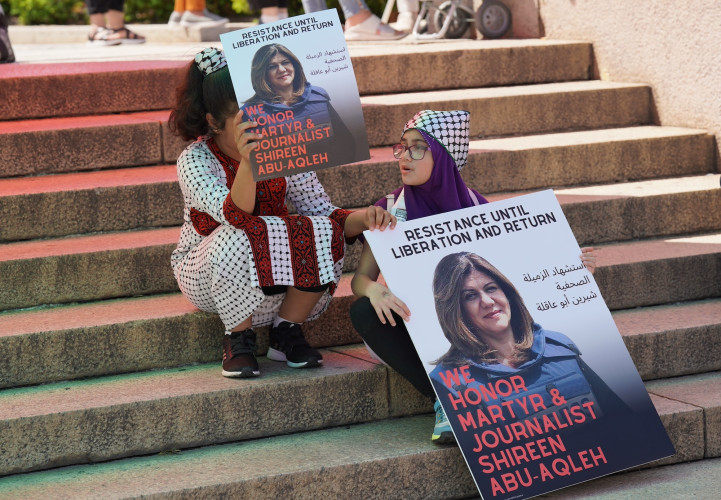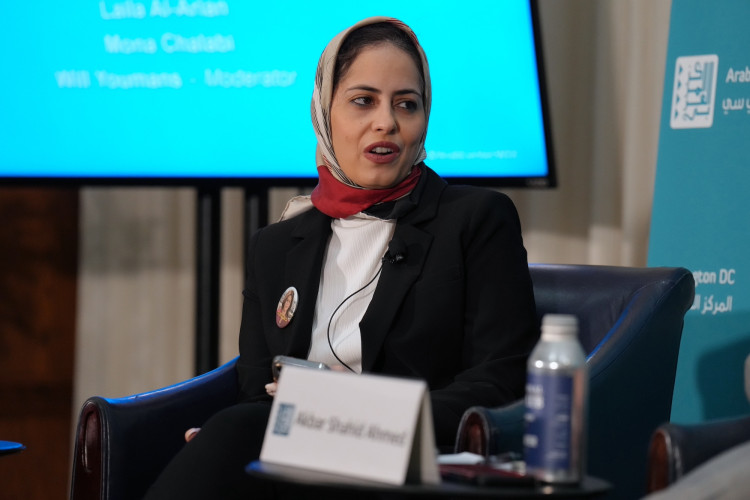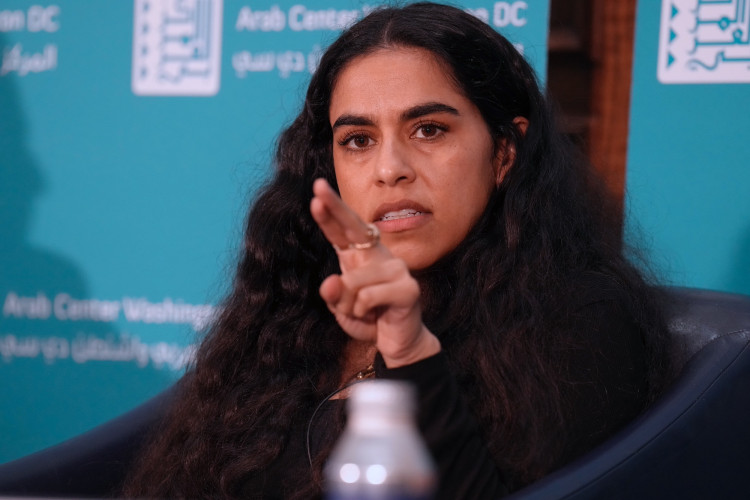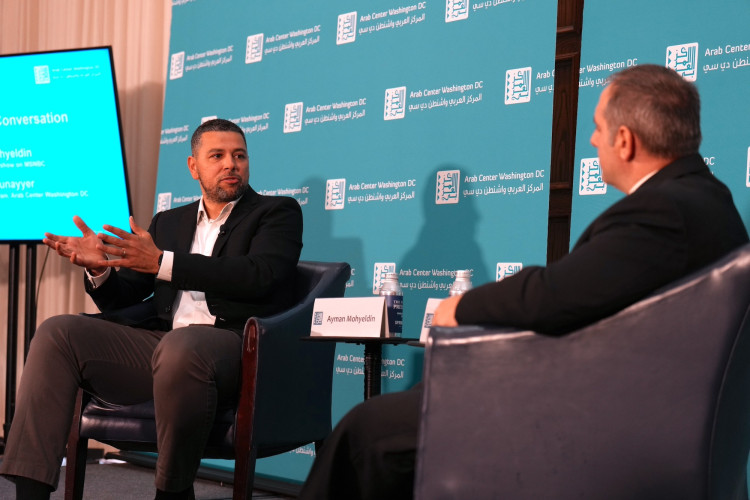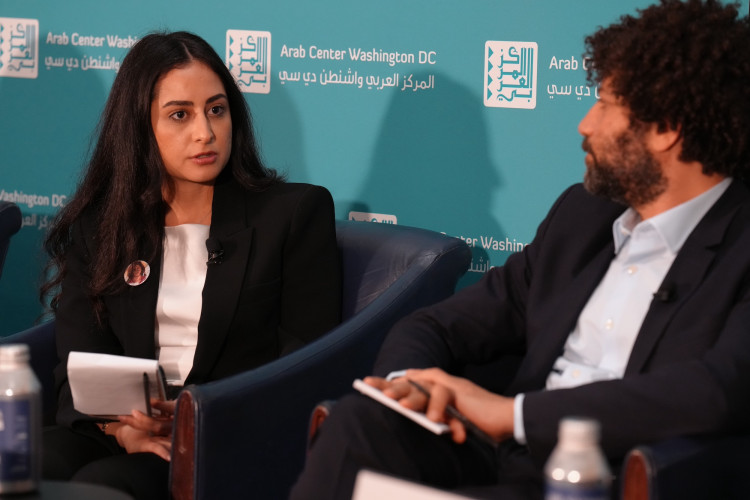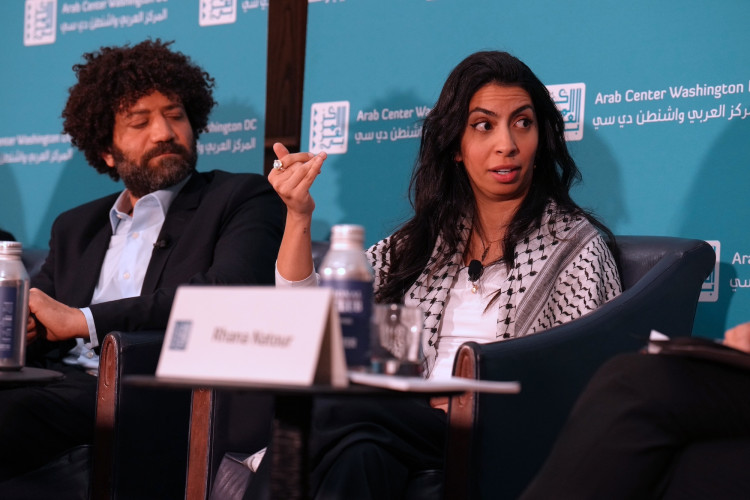From the Open-Publishing Calendar
From the Open-Publishing Newswire
Indybay Feature
Covering Palestine and Journalists Deaths in Gaza
Reflecting on the unprecedented number of journalists killed in Gaza by the Israeli military along with their intentional killing of Palestinian-American journalist Shireen Abu Akleh two years ago, the Arab Center Washington, DC held an all-day symposium at the National Press Club (NPC) delving into the state of press coverage and journalists’ deaths in Palestine and Gaza.
WASHINGTON (05-11) – Reflecting on the unprecedented number of journalists killed in Gaza by the Israeli military along with their intentional killing of Palestinian-American journalist Shireen Abu Akleh two years ago, the Arab Center Washington, DC held an all-day symposium at the National Press Club (NPC) delving into the state of press coverage and journalists’ deaths in Palestine and Gaza.
The program, dedicated to the memory of Shireen Abu Akleh, opened with a poignant memorial visual presentation with 100 photos of the over 140 journalists killed in Gaza since October 7.
Arab Center Director Khalil Jahshan, speaking of his friend Shireen, reflected on her as being “candid, composed, precise and substantive with very professional qualities that characterized her journalistic career that followed throughout the following two decades.”
Appearing remotely, keynote speaker Senator Chris Van Hollen (D-MD) revealed the mostly underreported and horrific fact as listed by Reporters Without Borders (RSF) that more journalists have been killed in Gaza in the past seven months than in Mexico over 20 years. Mexico is considered the most dangerous place for journalists in the world.
Wearing a button with Shireen’s picture on it, Laila Al-Arian from Al Jazeera, on the first panel titled “What the Western Media Gets Right and Wrong,” said that reading the names of all 36,000 victims of those killed during the genocide in Gaza would take 20 hours and warned that “We must not lose our humanity and remain silent during all of this.”
Mona Chalabi from The Guardian US reflected on the use of the wrong verbs in western media by using the term “died” instead of “killed” along with “migration” instead of “displacement” when reporting on Gaza which she characterized as “lies driven by ideology and malicious deceit.”
In speaking about western editors involved in the production of articles on the conflict, Chalabi noted that editors mostly unfamiliar with the history and context, use “style books” that are formulated to define the conflict by eliminating such terms as “Palestinian” among others. She went on to talk about journalists being assigned to cover the Middle East who have no previous experience in the area and their being given the title of articles created by editors with fixed agendas, such as “Antisemitism on Campus” around which a journalist would fill in information formulated to support that narrative.
She also cited an article in The New Yorker titled “Hamas’ Propaganda War” implying that “Palestinian journalists who are putting their lives on the line are doing Hamas’ propaganda” for them.
Al-Arian referred to this as “regurgitating Israeli official narratives… that turn out to be lies and propaganda,” noting that many people in the newsroom are troubled by this and unhappy to be a part of the “media bias” favoring Israel and are now speaking out more.
She went on to say that “to be an Arab journalist is to not be believed,” and that she has reviewed and compared how asymmetrical and extensive the coverage is on the number of “Israeli people who have been killed versus the Palestinian people who had been killed.”
TV host and journalist Ayman Mohyeldin, a Palestinian American, speaking with Yousef Munayyer of the Arab Center, related his personal experience of having covered Gaza both on the ground during war and from the anchor’s chair in New York. He eloquently described having worked with Shireen and other Palestinian journalists saying that their reporting had a “very granular” knowledge and context of the stories they covered that western journalists’ reporting lacked.
Having worked with Shireen and learning from her and others who have lived the story of conflict there “day in and day out,” he said, “shapes your coverage as a reporter and changes your entire outlook and the ability to report it. What she has taught me has stayed with me as a journalist throughout my entire career.” He confessed that while being unable to change anything through reporting, he was, however, empowered to be “The voice for the voiceless.”
On the second panel titled, “Journalism under fire: Risking It All to Tell the Story,” Shireen Abu Akleh’s niece Lina Abu Akleh said the family’s journey in “calling for the bare minimum of justice for Shireen” has been difficult and warning that “without justice for Shireen, this will give the green light to kill more journalists.”
Speaking on how Shireen’s widely condemned killing was reported in the media, she said that it was without context covering only basic information making it seem that Shireen somehow had “magically died” based on the lack of context and substantive facts. Saying “she was killed” as reported, neglected to mention how and by whom and that “It was disheartening seeing how fellow journalists covered the killing of Shireen.”
After the killing she went on to say that “Advocating [for justice] should not have been our role as a family, we should have been mourning. They didn’t just kill Shireen, they also attacked the funeral, that was another violation that was another attack on her dignity and our right to put her to rest. We felt it was silencing Shireen twice.”
She characterized the lack of a credible U.S. investigation into Shireen’s killing by saying that “the “Administration has failed our family” and that it was “not a surprise.”
Eman Mohammed, a Palestinian photojournalist from Gaza, spoke about western journalists covering Gaza by saying that “With the genocide happening in Gaza now, I am distraught with the silence, the complicity, the abandonment that my colleagues are experiencing.” Referring to the unprecedented toll of Palestinian journalists being killed in Gaza she admitted, “I don’t know how we got here to this level of inhumanity.”
Reacting to the statement of letting foreign journalists into Gaza, she said “The problem is not in the coverage, the problem is in protecting the coverage, the coverage is top notch. If I was covering, I would just throw the images raw and be like take it.”
“I would love to see, but I would not love to see, how the world would react when white journalists start to drop, because we have seen six aid workers, white foreign aid workers get killed by Israel and we have seen the drastic different reaction.”
“Everyone keeps saying ‘oh we need foreign journalists inside of Gaza’ but not for the coverage to improve we need it for different reasons. I see now that we are all disposable.” She pointed out that “the media is not the same as journalists. The media is clicks, its profits, its views. The journalists are journalists and without you they don’t have content and they don’t have credibility they don’t have anything whatsoever.”
When asked how her colleagues in Gaza react about not getting the same respect as western journalists, she responded by saying that “They are aware but at the same time they have the intelligence to separate the media and their journalists.”
“When we work in Gaza and we have a foreign journalist, no matter who that foreign journalist is, they need an army of us to work with them to make it possible for them to get their story. They need fixers, they need translators, they need drivers, they need us to vouch with the locals to get that story for them to be trusted. They parachute in and we need to work around them to get them that trust even if they stay there for a month, and they think they are more credible than us.”
“Without us they don’t have a story and then we need them to tell our story. It’s kind of not even laughable; it’s insulting. And then when we’re the ones getting killed, they don’t have the words to say, ‘Israel killed Palestinian journalists.’ So, I mean it’s complicity and the lack of having a backbone…”
Report and photos by Phil Pasquini
© 2024 nuzeink all rights reserved worldwide
The program, dedicated to the memory of Shireen Abu Akleh, opened with a poignant memorial visual presentation with 100 photos of the over 140 journalists killed in Gaza since October 7.
Arab Center Director Khalil Jahshan, speaking of his friend Shireen, reflected on her as being “candid, composed, precise and substantive with very professional qualities that characterized her journalistic career that followed throughout the following two decades.”
Appearing remotely, keynote speaker Senator Chris Van Hollen (D-MD) revealed the mostly underreported and horrific fact as listed by Reporters Without Borders (RSF) that more journalists have been killed in Gaza in the past seven months than in Mexico over 20 years. Mexico is considered the most dangerous place for journalists in the world.
Wearing a button with Shireen’s picture on it, Laila Al-Arian from Al Jazeera, on the first panel titled “What the Western Media Gets Right and Wrong,” said that reading the names of all 36,000 victims of those killed during the genocide in Gaza would take 20 hours and warned that “We must not lose our humanity and remain silent during all of this.”
Mona Chalabi from The Guardian US reflected on the use of the wrong verbs in western media by using the term “died” instead of “killed” along with “migration” instead of “displacement” when reporting on Gaza which she characterized as “lies driven by ideology and malicious deceit.”
In speaking about western editors involved in the production of articles on the conflict, Chalabi noted that editors mostly unfamiliar with the history and context, use “style books” that are formulated to define the conflict by eliminating such terms as “Palestinian” among others. She went on to talk about journalists being assigned to cover the Middle East who have no previous experience in the area and their being given the title of articles created by editors with fixed agendas, such as “Antisemitism on Campus” around which a journalist would fill in information formulated to support that narrative.
She also cited an article in The New Yorker titled “Hamas’ Propaganda War” implying that “Palestinian journalists who are putting their lives on the line are doing Hamas’ propaganda” for them.
Al-Arian referred to this as “regurgitating Israeli official narratives… that turn out to be lies and propaganda,” noting that many people in the newsroom are troubled by this and unhappy to be a part of the “media bias” favoring Israel and are now speaking out more.
She went on to say that “to be an Arab journalist is to not be believed,” and that she has reviewed and compared how asymmetrical and extensive the coverage is on the number of “Israeli people who have been killed versus the Palestinian people who had been killed.”
TV host and journalist Ayman Mohyeldin, a Palestinian American, speaking with Yousef Munayyer of the Arab Center, related his personal experience of having covered Gaza both on the ground during war and from the anchor’s chair in New York. He eloquently described having worked with Shireen and other Palestinian journalists saying that their reporting had a “very granular” knowledge and context of the stories they covered that western journalists’ reporting lacked.
Having worked with Shireen and learning from her and others who have lived the story of conflict there “day in and day out,” he said, “shapes your coverage as a reporter and changes your entire outlook and the ability to report it. What she has taught me has stayed with me as a journalist throughout my entire career.” He confessed that while being unable to change anything through reporting, he was, however, empowered to be “The voice for the voiceless.”
On the second panel titled, “Journalism under fire: Risking It All to Tell the Story,” Shireen Abu Akleh’s niece Lina Abu Akleh said the family’s journey in “calling for the bare minimum of justice for Shireen” has been difficult and warning that “without justice for Shireen, this will give the green light to kill more journalists.”
Speaking on how Shireen’s widely condemned killing was reported in the media, she said that it was without context covering only basic information making it seem that Shireen somehow had “magically died” based on the lack of context and substantive facts. Saying “she was killed” as reported, neglected to mention how and by whom and that “It was disheartening seeing how fellow journalists covered the killing of Shireen.”
After the killing she went on to say that “Advocating [for justice] should not have been our role as a family, we should have been mourning. They didn’t just kill Shireen, they also attacked the funeral, that was another violation that was another attack on her dignity and our right to put her to rest. We felt it was silencing Shireen twice.”
She characterized the lack of a credible U.S. investigation into Shireen’s killing by saying that “the “Administration has failed our family” and that it was “not a surprise.”
Eman Mohammed, a Palestinian photojournalist from Gaza, spoke about western journalists covering Gaza by saying that “With the genocide happening in Gaza now, I am distraught with the silence, the complicity, the abandonment that my colleagues are experiencing.” Referring to the unprecedented toll of Palestinian journalists being killed in Gaza she admitted, “I don’t know how we got here to this level of inhumanity.”
Reacting to the statement of letting foreign journalists into Gaza, she said “The problem is not in the coverage, the problem is in protecting the coverage, the coverage is top notch. If I was covering, I would just throw the images raw and be like take it.”
“I would love to see, but I would not love to see, how the world would react when white journalists start to drop, because we have seen six aid workers, white foreign aid workers get killed by Israel and we have seen the drastic different reaction.”
“Everyone keeps saying ‘oh we need foreign journalists inside of Gaza’ but not for the coverage to improve we need it for different reasons. I see now that we are all disposable.” She pointed out that “the media is not the same as journalists. The media is clicks, its profits, its views. The journalists are journalists and without you they don’t have content and they don’t have credibility they don’t have anything whatsoever.”
When asked how her colleagues in Gaza react about not getting the same respect as western journalists, she responded by saying that “They are aware but at the same time they have the intelligence to separate the media and their journalists.”
“When we work in Gaza and we have a foreign journalist, no matter who that foreign journalist is, they need an army of us to work with them to make it possible for them to get their story. They need fixers, they need translators, they need drivers, they need us to vouch with the locals to get that story for them to be trusted. They parachute in and we need to work around them to get them that trust even if they stay there for a month, and they think they are more credible than us.”
“Without us they don’t have a story and then we need them to tell our story. It’s kind of not even laughable; it’s insulting. And then when we’re the ones getting killed, they don’t have the words to say, ‘Israel killed Palestinian journalists.’ So, I mean it’s complicity and the lack of having a backbone…”
Report and photos by Phil Pasquini
© 2024 nuzeink all rights reserved worldwide
For more information:
https://www.facebook.com/media/set?vanity=...
Add Your Comments
We are 100% volunteer and depend on your participation to sustain our efforts!
Get Involved
If you'd like to help with maintaining or developing the website, contact us.
Publish
Publish your stories and upcoming events on Indybay.
Topics
More
Search Indybay's Archives
Advanced Search
►
▼
IMC Network


